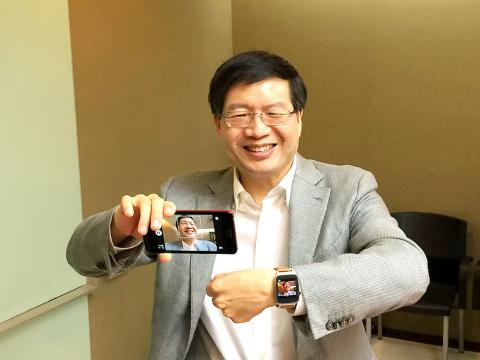Asustek Computer Inc (華碩) yesterday launched its new Transformer Book Chi series as part of an effort to double shipments of its two-in-one detachable devices to 6 million units this year, a company executive said yesterday.
“As of recently, our Transformer Book T100 launched in October 2013 has shipped more than 3 million units and we have confidence that the shipment of the new Transformer Book Chi series will outperform T100’s record,” Asustek chief executive officer Jerry Shen (沈振來) said at the product launch in Taipei.
Shen said the Transformer Book T100 served as a key growth driver for the company last year, adding that not only did the product make impressive sales, it also accounted for 20 percent of the firm’s total revenue.

Photo: CNA
“We hope the revenue of tablet-notebook hybrid devices will increase by 20 percent to 30 percent this year, with the launch of the new Transformer Book Chi series product line,” Shen said.
Asustek also launched two new ZenBook models — Asus ZenBook UX305 and ZenBook Pro UX501.
Shen said the functionality and efficiency of the two models are better than rival Apple Inc’s MacBook Pro.
Shen said he nicknamed the 15.6-inch ZenBook Pro UX501 a “high-performance monster,” as the product is 2.06cm thick, but has an ultra-high-resolution — or 4K — display with an Intel Core i7 processor and gaming-grade graphics.
Asustek is upbeat that its PC segment will put up a strong performance this year, driven by sales of the new two-in-one devices, the ZenBook series, its Chromebook and its low-cost EeeBook, Shen said.
The company is set to launch a new Chromebook in the next quarter, Shen added.
Asustek’s goal is to achieve 15 percent growth in PC-related product shipments every year and to double PC-related product shipments within five years, Shen said.
According to market researcher TrendForce’s latest report, Asustek’s notebook shipments accounted for 11 percent of the market, or 19.3 million units, last year, ranking it fourth in terms of global notebook shipments, beating its rival Acer Inc (宏碁).
Separately, Shen said chipmaker Qualcomm being fined US$975 million by the Chinese government for violating antimonopoly laws is positive news for Asustek.
However, he declined to comment further on the news for the time being, saying that he would talk more about it at an investors’ conference set for Friday.
Asustek’s smartphone brand Pegasus, which launched a smartphone in China last month, uses Qualcomm’s processor.

CHIP RACE: Three years of overbroad export controls drove foreign competitors to pursue their own AI chips, and ‘cost US taxpayers billions of dollars,’ Nvidia said China has figured out the US strategy for allowing it to buy Nvidia Corp’s H200s and is rejecting the artificial intelligence (AI) chip in favor of domestically developed semiconductors, White House AI adviser David Sacks said, citing news reports. US President Donald Trump on Monday said that he would allow shipments of Nvidia’s H200 chips to China, part of an administration effort backed by Sacks to challenge Chinese tech champions such as Huawei Technologies Co (華為) by bringing US competition to their home market. On Friday, Sacks signaled that he was uncertain about whether that approach would work. “They’re rejecting our chips,” Sacks

NATIONAL SECURITY: Intel’s testing of ACM tools despite US government control ‘highlights egregious gaps in US technology protection policies,’ a former official said Chipmaker Intel Corp has tested chipmaking tools this year from a toolmaker with deep roots in China and two overseas units that were targeted by US sanctions, according to two sources with direct knowledge of the matter. Intel, which fended off calls for its CEO’s resignation from US President Donald Trump in August over his alleged ties to China, got the tools from ACM Research Inc, a Fremont, California-based producer of chipmaking equipment. Two of ACM’s units, based in Shanghai and South Korea, were among a number of firms barred last year from receiving US technology over claims they have

It is challenging to build infrastructure in much of Europe. Constrained budgets and polarized politics tend to undermine long-term projects, forcing officials to react to emergencies rather than plan for the future. Not in Austria. Today, the country is to officially open its Koralmbahn tunnel, the 5.9 billion euro (US$6.9 billion) centerpiece of a groundbreaking new railway that will eventually run from Poland’s Baltic coast to the Adriatic Sea, transforming travel within Austria and positioning the Alpine nation at the forefront of logistics in Europe. “It is Austria’s biggest socio-economic experiment in over a century,” said Eric Kirschner, an economist at Graz-based Joanneum

OPTION: Uber said it could provide higher pay for batch trips, if incentives for batching is not removed entirely, as the latter would force it to pass on the costs to consumers Uber Technologies Inc yesterday warned that proposed restrictions on batching orders and minimum wages could prompt a NT$20 delivery fee increase in Taiwan, as lower efficiency would drive up costs. Uber CEO Dara Khosrowshahi made the remarks yesterday during his visit to Taiwan. He is on a multileg trip to the region, which includes stops in South Korea and Japan. His visit coincided the release last month of the Ministry of Labor’s draft bill on the delivery sector, which aims to safeguard delivery workers’ rights and improve their welfare. The ministry set the minimum pay for local food delivery drivers at